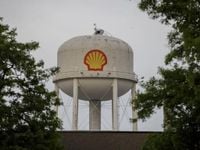In a significant display of resilience amid turbulent energy markets, Shell reported strong financial results in its first-quarter earnings on May 2, 2025. The company announced its capability to buy back over US$3 billion in shares each quarter, even if crude oil prices were to drop to as low as US$50 a barrel. This announcement comes as Shell navigates the challenges presented by declining oil prices, which have been exacerbated by the ongoing trade war initiated by U.S. President Donald Trump earlier in April.
Shell's shares saw a three percent increase, reaching 2,508.5 pence during trading in London on the same day. This uptick reflects the market's positive reception to Shell's financial strategies and cost-cutting measures implemented under the leadership of Chief Executive Wael Sawan. The company's focus on improving reliability and shedding underperforming assets has positioned it favorably compared to local rival BP Plc.
Despite the overall decline in cash flow from operations, which fell from US$13.16 billion in the prior quarter to US$9.28 billion, Shell reported an adjusted net income of US$5.58 billion. This figure surpassed the average analyst estimate of US$5.07 billion and was down from US$7.73 billion a year earlier. Chief Financial Officer Sinead Gorman emphasized the company's stability, stating, "We’re just working through our plan and we don’t really change anything. But I do understand for other companies that can be more difficult when they haven’t positioned quite as well." This statement underscores Shell's confidence in its financial strategy amid industry volatility.
Shell's net debt increased to US$41.52 billion, up from US$38.81 billion in the previous quarter, while the gearing ratio, which measures the proportion of debt in relation to equity, rose from 17.7 percent to 18.7 percent. These figures highlight the balancing act faced by oil companies as they strive to maintain cash returns to investors while also investing in new projects and managing debt levels.
In a notable contrast to some of its European peers, Shell has opted to maintain its capital investment levels, while companies like BP and Eni SpA have chosen to scale back. This decision reflects Shell's commitment to its long-term growth strategy, which includes a robust plan for share buybacks. According to a presentation slide, Shell can continue repurchasing shares as long as the price of Brent crude remains above US$50, with buybacks ceasing only if prices fall to US$40.
In addition to its financial maneuvers, Shell has also made strategic moves in its operational assets. The company announced the completion of an agreement to increase its stake in the Ursa platform from 45.3884 percent to 61.3484 percent. The Ursa Tension Leg Platform (TLP) is situated approximately 130 miles (210 km) southeast of New Orleans, in Mississippi Canyon block 809, at a depth of 4,000 feet. This acquisition is part of Shell's broader strategy to invest in profitable and carbon-competitive oil and gas projects, ensuring a stable production of liquids from its upstream business.
The Ursa TLP is an essential component of Shell's operations, connecting to the West Delta 143 platform through two oil and gas pipelines. This infrastructure facilitates the transfer of production from the Mars corridor to onshore crude terminals. With the increased stake, Shell now holds a 61.3484 percent working interest in the Ursa TLP, alongside partners BP Exploration & Production Inc. and ECP GOM III, LLC.
Furthermore, the agreement includes a 11.81 percent membership interest in the Shell-operated Ursa Oil Pipeline Co. LLC, which will be held by Shell Pipeline Company (SPLC). This adjustment follows the preferential rights election by partners, raising Shell's working interest in the Ursa pipeline to 57.20 percent. The company also holds a 1 percent working interest in the Europa prospect, further solidifying its position in the region.
Analysts have noted that Shell's financial resilience sets it apart from its competitors. Jefferies analysts, including Giacomo Romeo, remarked that Shell is the most financially resilient international oil company amidst a weak macroeconomic environment. This resilience is attributed to the company's solid balance sheet and strategic planning, which allows it to weather downturns more effectively than others in the industry.
As Shell continues to navigate the complexities of the energy market, its ability to execute share buybacks and invest in key assets positions it well for future growth. The company's commitment to maintaining a strong balance sheet while pursuing strategic acquisitions reflects a forward-thinking approach that could pay dividends in the long run.
Overall, Shell's first-quarter report and its operational developments signal a robust strategy that aims to sustain its market position, even as the energy sector grapples with fluctuating prices and global economic challenges. The company's proactive measures and strong leadership under Sawan and Gorman highlight a commitment to not just surviving but thriving in a competitive landscape.




